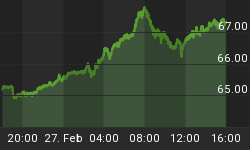As expected, the US revised the most recent quarter's GDP from barely positive to sharply negative today. But once again the true extent of the problem was hidden by some statistical sleight of hand, in this case wildly-optimistic inflation assumptions.
Here's an excerpt from the Consumer Metrics Institute's just-published analysis:
May 29, 2014 - BEA Revises 1st Quarter 2014 GDP Sharply Downward to Outright Contraction at Nearly 1% Annual Rate:
In their second estimate of the US GDP for the first quarter of 2014, the Bureau of Economic Analysis (BEA) reported that the economy was contracting at a -0.99% annualized rate. When compared to prior quarters, the new measurement is down over 3.6% from the 2.64% growth rate reported for the 4th quarter of 2013, and it is now more than 5% lower than the 4.19% reported for the 3rd quarter of 2013.
The previously reported quarterly growth in real annualized per-capita disposable income was revised downward to $95 (and that disposable income figure is now $227 per year lower than it was during the fourth quarter of 2012), while the household savings rate shrank again to 4.0% (down -0.9% from the 4.9% in the prior quarter and down -2.6% from the fourth quarter of 2012).
And lastly, for this report the BEA assumed annualized net aggregate inflation of 1.28%. During the first quarter (i.e., from January through March) the growth rate of the seasonally adjusted CPI-U index published by the Bureau of Labor Statistics (BLS) was over a half percent higher at a 1.80% (annualized) rate, and the price index reported by the Billion Prices Project (BPP -- which arguably reflected the real experiences of American households while recording sharply increasing consumer prices during the first quarter) was over two and a half percent higher at 3.91%. Under reported inflation will result in overly optimistic growth data, and if the BEA's numbers were corrected for inflation using the BLS CPI-U the economy would be reported to be contracting at a -1.52% annualized rate. If we were to use the BPP data to adjust for inflation, the first quarter's contraction rate would have been a staggering -3.64%.
Summary and Commentary
This is a bad report, and the numbers speak for themselves. And looking at the trend lines, things are unlikely to get better anytime soon.
But we also feel compelled to digress from the bad news itself. While other people may be utterly shocked to find that the economy is in contraction, we are much more inclined to outrage at the possibility that the BEA published clearly fictitious numbers last month in an effort to "ease" the readings towards the bad news that they knew (or should have known) would follow shortly :
- If they (the BEA) did not realize last month that the US economy was in contraction during the first quarter of 2014, they are sufficiently incompetent (in practice and procedure) to merit a complete overhaul and/or gutting of the agency.
- That said, gross incompetence is probably the lesser evil -- simply because if they knew full well last month how bad the news really had become, they simply descended into a Goebbelesque world of publishing what they wanted the world to think.
Some thoughts
Isn't it interesting that of all the available inflation indicators, the BEA always seems to choose the one that makes GDP look most favorable? What a fascinating coincidence.
Another stat that's worth noting is "annualized per-capita disposable income," which is lower today than at the end of 2012. How can an economy be growing if the disposable income of the average citizen is shrinking? The answer is that it can't. And remember that under realistic inflation assumptions, the shrinkage would be even bigger, meaning that the contraction in the size of the US economy would appear to be accelerating rather than abating.















